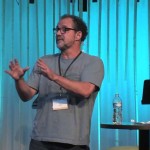We run our website the way we wished the whole internet worked: we provide high quality original content with no ads. We are funded solely by your direct support. Please consider supporting this project.

A Brief History of Political Power and the Church
The history of the church has been largely one of believers refusing to trust the way of the crucified Jesus and instead giving in to the very temptation he resisted. It’s the history of an institution that has frequently traded its holy and distinct mission for what it thought was a good mission. It is the history of an organization that has frequently forsaken the slow, discrete, nonviolent, sacrificial way of transforming the world for the immediate, obvious, practical, and less costly way of improving the world. It is a history of a people who have too often identified the kingdom of God with a “Christian” version of the kingdom of the world.
For the first 300 years, this wasn’t so. Followers of Jesus during this time saw themselves as “resident aliens.” They were a persecuted minority and as such did not dream of corporately exercising power in order to control political systems. Indeed, the church of this time grew not by Christians fighting for their rights, as so many do today, but largely by Christians being put to death. It was during this time that the word martyr, which originally meant “witness,” came to mean “one who dies for their faith,” for dying was one of the primary ways these early Christians witnessed for their faith.
It’s difficult to overemphasize the change that occurred when, in AD 312, the emperor Constantine was converted. Just prior to an important battle, legend has it that Constantine had a vision in which he was told to paint Chi Rho (the first two letters of the Greek word for “Christ”) on the shields of his soldiers. Allegedly, a voice in the vision announced, “By this sign you shall conquer.”
Constantine obeyed the vision and won the battle. The magic apparently worked, and so Constantine and his administration dedicated themselves to the Christians’ God. This was the first time anyone ever associated the Christian faith with violence, but its success stained the church from then on.
Constantine legalized Christianity in AD 313, and because of its association with him, the religion immediately exploded in popularity. Within seventy years it was proclaimed the official religion of the Roman Empire. The first recorded instance of Christians killing pagans occurred shortly after. In short order, the militant church extended its power by conquering lands and peoples throughout Europe, compelling them to become baptized Christians or die.
The cross-centered kingdom became a violent kingdom that embraced the sword. The church had become “the church militant and triumphant,” and the kingdom of God, manifested in the crucified Jesus, had become the empire of Christendom.
The sacrificial love and humility that characterized Christ and the early church had to be reinterpreted at this time to accommodate the new power that the church leaders believed God had given to the church. The lifestyle of Jesus and the early church came to be understood as a provisional inconvenience that had to be tolerated until Christianity could gain status in the world. Jesus and the early disciples had to be humbled and suffer, it was argued, because they didn’t have the power to do otherwise.
They argued that since the church knows the truth and thus knows what is best for all people it would be positively immoral to lay this power aside. Rather, the church used its newfound power to compel (by force) heathens and heretics to agree with it and be saved.
For the sake of the kingdom of God, we must rethink all of this. We must once again proclaim with our lives, and with our words when necessary, that the sole criteria for whether something is a manifestation of the kingdom of God or not is the person of Jesus Christ. Kingdom people need to lead the charge in proclaiming that the church has nothing to do with the kingdom of God whenever it wields the sword instead of loving. Only to the extent that the church looks like Jesus, dying for those who crucified him and praying for their forgiveness—to that degree can the people of God be said to manifest the kingdom of God.
—Adapted from The Myth of a Christian Nation, pages 75-82
Photo credit: johnpaulsimpson via Visual hunt / CC BY-ND
Category: General
Tags: Church, Constantine, Political Idolatry, Politics, Power
Related Reading

Believing the Best About Political Opponents
The surprising election of Donald Trump to President of the United Stated has exposed a profound, anger-filled divide running through the center of the American population. I would like to speak to the many Christians who are on the side of the divide that is outraged by his victory. In light of the offensive things Trump…

How To Fix The Church: The Kingdom of God (Part 4)
God has leveraged everything on the Church loving like Jesus loved, as outlined in our previous posts in this series. “By this the world will know you are my disciples,” Jesus said, “by your love” (Jn 13:35). By God’s own design, Christ-like love is supposed to be the proof that Jesus is real. In John…

Bowing to the American Flag. Literally.
Kurt Willems shared this interesting item he found on Amazon. In the product description it admonishes us to: Submit yourself to the Prayer Bench and open up your life to receive more of God. Hmmmmmm. How about we just submit ourselves to God?

Lessons from Jimmy Fallon
David Henson published a blog last week entitled 6 Things the Church Can Learn From Jimmy Fallon that we thought was a tad profound. What would the church look like if we embraced these lessons? Well, let’s just say that we’d take ourselves a little less seriously. You should read the entire blog post, but…

Greg Shares His Journey and Some Challenges Ahead
http://youtu.be/YdZKPG20kmQ Last September, Greg was asked to give the opening address at the Missio Alliance event Church & Post-Christian Culture: Christian Witness in the Way of Jesus. You can find more information here. Special thanks to our very own Stephen Konsor for his role in filming and editing this and other sessions. Enjoy!

Election Benediction
On this election day, when so many Americans are experiencing high levels of anxiety, I thought it would be good to share an “Election Benediction” that was written and sent to me by Kenneth Tanner. Let it ground you in the love, peace and security of Christ and his Kingdom. An Election Benediction By Kenneth…
